
“Experience never misleads; what you are misled by is only your judgment, and this misleads you by anticipating results from experience of a kind that is not produced by your experiments.” — Leonardo

“Experience never misleads; what you are misled by is only your judgment, and this misleads you by anticipating results from experience of a kind that is not produced by your experiments.” — Leonardo
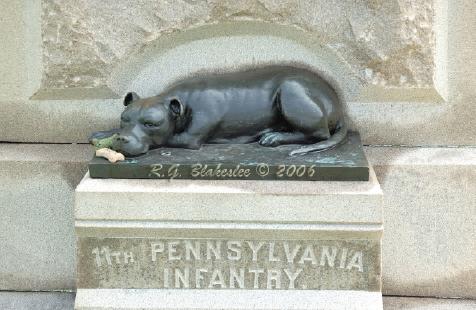
The 11th Pennsylania infantry regiment was beginning its training at the fairground in West Chester, Pa., in 1861 when a local resident presented a wicker basket to one of the officers. In the basket was a 4-week-old black female terrier puppy. The dog, quickly named Sallie after a local beauty whom the soldiers admired, made hundreds of friends among the men and was adopted as the regiment’s official mascot.
“Sallie knew the drumroll announcing reveille,” writes James Robertson in The Untold Civil War. “She was first out of quarters to attend roll call. During drills, she latched on to a particular soldier and pranced alongside him throughout the exercise. At dress parade, the dog marched proudly beside the regimental colors. At encampments, she slept by the captain’s tent after strolling leisurely through the grounds on her own kind of inspection.”
She accompanied the regiment into battle at Cedar Mountain, Antietam, Fredericksburg, and Chancellorsville, standing stoutly on the front lines and barking ferociously at the enemy. In 1863 Abraham Lincoln tipped his hat to her as he reviewed the Army of the Potomac. On the first day’s fighting at Gettysburg, the regiment was driven back a mile from its original position and she was feared lost; she was discovered three days later standing guard over the wounded and the dead.
She survived, in fact, nearly to the end of the war. On Feb. 5, 1865, at the Battle of Hatcher’s Run during the Siege of Petersburg, men in the second wave of a Union attack found her dead on the battlefield, shot through the head. She had died instantly.
In 1890, the surviving veterans of the 11th Pennsylvania erected a monument at Gettysburg. From a distance it looks like other regimental memorials, a defiant soldier atop a marble pedestal. But on a ledge near the base of the monument lies a small bronze dog.
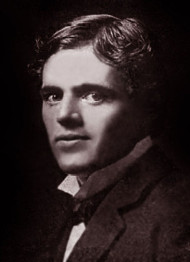
Jack London died in 1916, but he turned up, gamely, in 1920 when psychic Margaret More Oliver tried to reach him through automatic writing. “I am at last attuned to life,” he wrote. “There is no discord — no conflict — the clash of mind and will with heart and impulse of soul has ended.”
She proposed that he write a story through her, and after many false starts they succeeded. “I am getting it over!” he wrote. “I am jubilant! Oh, God! it’s good to be able to do it. My pen is coming back to earth and I shall do wonders yet.”
She sent the manuscript to London’s widow, Charmian, proposing to publish it as “Death’s Sting, by Jack London, Deceased.” But Charmian refused: “If I allowed a book to come out under such ‘authorship,’ immediately every faker in the land — and they are legion — would have perfect right to do the same … the selling value of bona fide work of Jack London’s would be more or less injured, and too much depends on this.”
Oliver pressed her, but Charmian was adamant: “If I should ever be convinced, beyond the flutter of a doubt, I’d eat cyanide of potassium so quickly that I’d be on the Other Side, groping around for Jack, before I had time to think about it!”
The text of Death’s Sting seems to have been lost, but evidently it wasn’t very good — Charmian’s aunt, Netta Payne, wrote, “It has no touch of literary merit, no hint of power or idealistic beauty. It is a tedious detail of sordid facts without the least alleviation of literary artistry.” London’s spirit finally agreed: “I tried to speak with my old tongue, but my old tongue is silenced.”
One person who wasn’t surprised at any of this was Arthur Conan Doyle, who had written to Charmian a year after London’s death to suggest that “a strong soul dying prematurely with many earth interests in its thoughts, would be very likely to come back.”
“Mrs. London received my intrusion with courtesy,” Doyle wrote, “but I am not aware that any practical steps were taken toward this end. They seem now to have come from the other side.”
(Edward Biron Payne, The Soul of Jack London, 1927.)

“Books are fatal: they are the curse of the human race. Nine-tenths of existing books are nonsense, and the clever books are the refutation of that nonsense. The greatest misfortune that ever befell man was the invention of printing.” — Benjamin Disraeli
“The multitude of books is making us ignorant.” — Voltaire
“We live in an age that reads too much to be wise.” — Oscar Wilde
“The multitude of books is a great evil. There is no measure or limit to this fever of writing; everyone must be an author, some for some kind of vanity to acquire celebrity and raise a name, others for the sake of lucre or gain.” — Martin Luther
“There are times when I think that the reading I have done in the past has had no effect except to cloud my mind and make me indecisive.” — Robertson Davies
“The road to ignorance is paved with good editions.” — Bernard Shaw
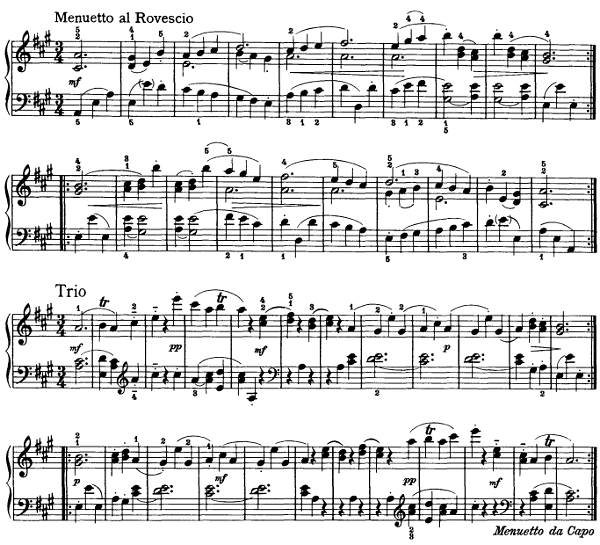
The minuet in Haydn’s Piano Sonata in A Major (Landon 41) is a palindrome. So is the trio that follows it.
The composer was so proud of his feat that he labeled the minuet Menuetto al Rovescio (“Minuet in Reverse”) and used it again in his Sonata No. 4 for Piano and Violin and his Symphony No. 47 in G major, “The Palindrome.”
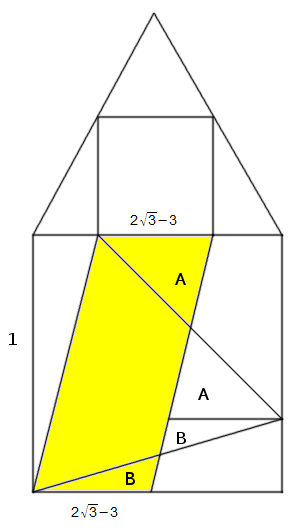
The area of the largest equilateral triangle that fits inside a unit square exactly equals the side of the largest square that fits inside a unit equilateral triangle.
This proof is due to John Conway. The largest square that fits inside a unit equilateral triangle is shown at the top; the side of the square is . The largest equilateral triangle that fits inside a unit square is one that’s canted at a 15° angle, shown at the bottom.
Now, the area of the shaded parallelogram is just its base times its height, or . And the parallelogram can be dissected into three pieces that fit precisely into the canted triangle. So the side of the square at the top equals the area of the triangle at the bottom.
“All my life I wanted to be somebody, but now I see I should have been more specific.” — Lily Tomlin

Do animals reason? British psychologist C. Lloyd Morgan offered the case of his own dog:
Tony, the fox-terrier, already introduced to my readers, when he wants to go out into the road, puts his head under the latch of the gate, lifts it, and waits for the gate to swing open. Now an observer of the dog’s intelligent action might well suppose that he clearly perceived how the end in view was to be gained, and the most appropriate means for effecting his purpose. The following chain of ideas might be supposed to pass through the dog’s mind, not, indeed, in a clear-cut logical form, but at any rate in a rough and practically serviceable way: ‘Why does that gate remain shut? The latch holds it. I’ll lift the latch. Now it is no longer held, therefore it swings open.’ But is it necessary to assume that there were ideas involving, even in the most rudimentary way, the why and the wherefore? May not the action be quite well explained on the hypothesis that the dog acted under the sole guidance of sense-experience?
Two observers might debate that question for some time, Morgan wrote, one arguing that Tony’s feat must be based on experience and the other insisting that it showed an understanding of how the gate operates. But Morgan himself had had the benefit of seeing the trick evolve. “I was sitting at a window above the garden, and heard the dog put out of the door. I therefore watched him. He ran up and down the low wall, and put his head out between the iron bars, now here, now there, now elsewhere, anxiously gazing into the road. This he did for quite three or four minutes. At length it so happened that he put out his head beneath the latch, which, as I have said, is at a convenient height for his doing so, being about a foot above the level of the wall. The latch was thus lifted. He withdrew his head, and began to look out elsewhere, when he found that the gate was swinging open, and out he bolted.”
So Tony’s trick was the product of a fortunate accident, not abstract reasoning. Morgan proposed a general rule: “In no case is an animal activity to be interpreted in terms of higher psychological processes if it can be fairly interpreted in terms of processes which stand lower in the scale of psychological evolution and development.” This has become known as Morgan’s canon.
(From Morgan’s 1903 book An Introduction to Comparative Psychology.)

The Viking 1 orbiter brought some surprised attention to the Cydonia region of Mars in 1976 when its cameras discovered what appeared to be an enigmatic face staring up into the heavens.
The “face on Mars” has since been explained as an optical illusion, but it recalls a project conceived 30 years earlier by the American artist Isamu Noguchi. Sculpture to Be Seen From Mars, below, was proposed as a massive earthwork to be constructed in “some unwanted area,” perhaps a desert, at an enormous scale, so that the nose would be 1 mile long. When seen from space, the face would show that a civilized life form had once existed on Earth. Noguchi had been embittered by his experiences as a Japanese-American during World War II and the development of atomic weapons; he had originally called the piece Memorial to Man.
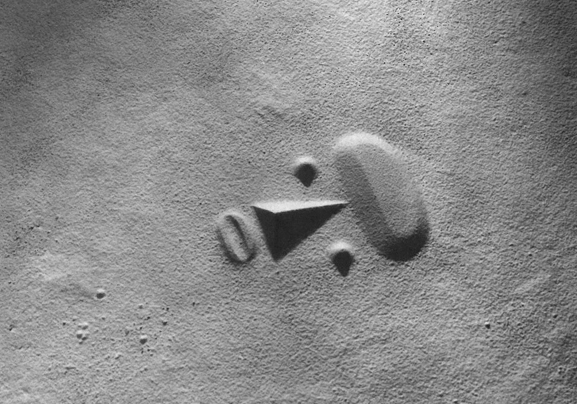
If those two don’t have enough to talk about, there’s a newcomer to join them: In 2013, face recognition software discovered the image below in a photo of the moon’s south pole taken by NASA’s Lunar Reconnaissance Orbiter. Who’s next?
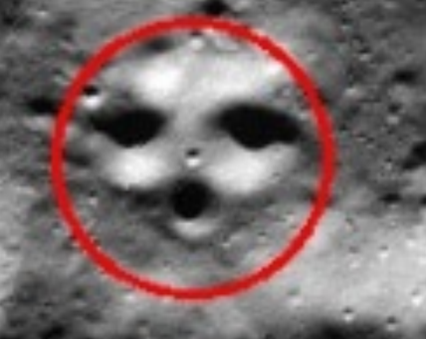

In 1880, freethinking attorney George Walser tried a new experiment in the American heartland — a community dedicated against Christianity, “the only town of its size in the world without a priest, preacher, saloon, God or hell.” In this week’s episode of the Futility Closet podcast, we’ll tell the story of Liberal, Missouri — its founding, its confrontations with its Christian neighbors, and its ironic downfall.
We’ll also puzzle over how a woman can suddenly be 120 miles away in just a few minutes.